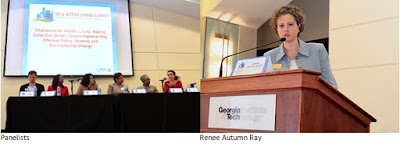The Fulton County Department of Health and Wellness Partnerships to
Improve Community Health (PICH) Program’s Active Living Summit, held on
February 5, 2016, attracted more than 80 research, policy, education, health
and urban planning professionals and community organization members who learned
about new tools and winning strategies for combatting chronic health problems
and encouraging active and healthy lifestyles.
The half-day event also featured a preview of the Environment, Health
and Livability Dashboard for County municipalities, as well as an informative
panel discussion on “Strategies for Implementing Effective Policy, Systems and
Environmental Change.” A dozen exhibitors also provided demonstrations and
dispensed product samples and information that promoted healthy lifestyles.
Interim County Health Director Dr. David Sarnow, along with PICH
Program Administrator Lisa Goodin and Monique Eppinger, Senior Management
Policy Analyst for County Commissioner Joan Garner, welcomed the audience and discussed
their mission not only to address public health problems but also to help
prevent them. They applauded the PICH Program for producing the Summit, calling
it an effective vehicle for disseminating prevention advice to practitioners
and residents.
Following opening remarks, Robin Parson, a fitness and recreation
specialist with the Health and Wellness Department bounded onto the stage at
the Georgia Institute of Technology Student Center Ballroom and led a rousing
interactive exercise demonstration.
The Dashboard preview was presented by Dr. Nisha Botchwey, Associate
Professor in the School of City and Regional Planning at Georgia Institute of
Technology, who leads the team developing the database in partnership with the
Fulton County PICH Program. Before offering a glimpse of the dashboard contents
and its functions, Dr. Botchwey engaged the audience in a discussion of the
role built and outdoor environmental conditions play in maintaining overall
good health. She also stressed that access to current health data and trends is
essential to developing sensible and effective health policy and systems-change
strategies.
Here are some key takeaways of the panel discussion, moderated by Renee
Autumn Ray of the Atlanta Regional Commission.
Rob Brawner of the Atlanta Beltline Partnership showcased the progress
to date and future goals for the multi-use urban development, including a plan
for transforming many thoroughfares into Complete Streets that will allow
pedestrians, bicyclists, motorists and transit riders of all ages and abilities
to access, use and share the roadways safely. Brawner told the audience that
the Partnership values input from neighborhood and community groups as well as
experts to understand what’s relevant and effective when planning new projects,
in order to achieve desirable cultural, environmental and behavioral changes
and to improve quality of life.
Melinda Pruitt of the Fulton County Department of Aging and Youth
Services described several successful strategies the agency has deployed to change
attitudes and build enthusiasm for adopting healthier behaviors. They include
the active involvement of youngsters serving as influencers among their peers
and within their families. The Department also conducts healthy cooking
demonstrations for faith-based groups, creates healthy-recipe cookbooks for
families and distributes healthy-eating coloring books for kids to encourage
lifestyle changes.
Debra Kibbe from Georgia State University’s
Georgia Health Policy Center described a childhood obesity model that helps
inform the complex effort involved in successfully informing legislators about
how their funding decisions may impact childhood obesity prevalence in the
long-term.
She also discussed how Fulton County Schools
are implementing professional development and innovative physical education
curricula to improve moderate to vigorous physical activity. “Schools vary in
their readiness to adopt the instruction strategies and resources,” she said.
“When starting, we had to make our case on a classroom-by-classroom basis.” Her
advice to others embarking on broad policy and program changes: Don't start
from scratch, find existing policies and programs, and adopt them so they are
replicable in your community.
Dr. Emily Anne Vall, who manages Georgia Shape, the Governor’s
childhood obesity program facilitated by the Georgia Department of Public
Health, discussed initiatives that will move the needle on child obesity. The
dialogue touched on various projects, some implemented through the Georgia
Women Infants and Children Supplemental Nutrition Program to help mothers
develop healthy eating habits for their families, as well as the Power Up for
30 physical activity program currently available for every elementary school in
the state.
Dr. Vall and Ms. Kibbe
recommended that the audience become involved with Georgia Shape, the
statewide, initiative in which governmental, philanthropic, academic and
business communities work collaboratively to address childhood
obesity through diverse strategies. The Georgia S.H.A.P.E. Act, passed in
2009, supports annual fitness assessment of Georgia's public school students in
grades 1-12. Attendees were encouraged
to educate themselves about renewal of the S.H.A.P.E. Act in 2018 to ensure
that the state can continue to increase and track the number of students in the
Healthy Fitness Zone for Body Mass Index and Aerobic Capacity.
Dr. Glenda Knight of the Diabetes Community Action Coalition said
community groups can provide a valuable service to constituents by providing
health literacy education that’s often overlooked by healthcare providers while
diagnosing and treating chronic disease. Her group helps patients learn to
self-manage their diseases and guides them to resources to navigate the
healthcare system and access needed services.
Dr. Shalonda Freeman of the Georgia Department of Public Health echoed
those comments and described a program developed by the agency in partnership
with the Georgia Pharmacy Association that trains community pharmacists to
assist patients with medication therapy management and to provide counseling
about medication.














No comments:
Post a Comment